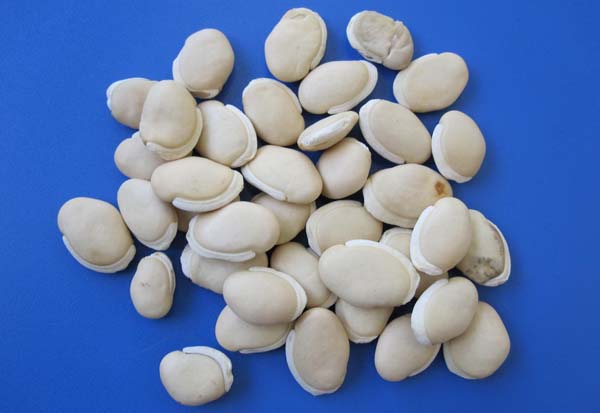Also known as Lablab purpureus or Dolichos labla, it is actually the seed of hyacinth plant. It has a few different names in different places, such as lablab bean, poor man's bean, and Tonga bean, to name but a few. In China, the funny thing is that they don't name after the color of purple but white.
This plant is one of Fabaceae annuals. It is native to tropics like Africa, Indonesia, and India. Later it was introduced to China in the Han and Jin Dynasty. This climbing herb can grow up to 6 meters in length. Stem presents light purple or light green color, usually glabrous or villous. The trifoliate leaves are with stalk of 4 to 14cm long. Hyacinth flower is often second racemes, 15 to 25cm long, and with erect sturdy florescence rachis. It usually produces 2 to 5 bean seeds in one pod, which are elliptical, white or magenta even black in color, 8 to 13mm long, 6 to 9mm wide, 4 to 7mm thick, with long ridgy umbilici and raphe, white ridgy semilunar strophiole in one side edge.
WHAT'S HYACINTH BEAN USED FOR?
As mentioned earlier, besides as an ornamental vine, it is food crop as well. Traditionally people consume the seeds, leaves, roots, pods and flowers. Curry and salad are two common favorite delicacies in some places. What's more, its edible seeds can serve as a medicinal herb though being considered toxic because of high concentrations of cyanogenic glucosides contained. But results of modern experiments indicate that boiling it for long enough time can make it harmless at all.

Hyacinth bean
RECIPES OF HYACINTH BEAN
They are rich in nutrition and contain more vitamins and minerals than most leaf, rhizome, and fruit vegetables. Also, it tastes tender and delicious. According to the "Composition of food table", each 100 grams of them contain 2.8g protein, 0.2g fat, 5.4g sugar, 35k calories, 1.4g crude fiber, 1.5mg iron, 0.32mg carotene, 0.05mg sulphur amine acids, 0.7mg nicotinic acid, and 13mg ascorbic acid etc. So to speak, it is a tonic, summer refreshant, and good medicine as well.
There are many nice recipes out there but in sweltering, humid summer day, the porridge made of hyacinth bean and rice is the one highly suggested. This recipe is simple but good at strengthening spleen while warming stomach, clearing away the summerheat and eliminating dampness, and invigorating Qi to cure Diarrhea. You just need to follow a few steps to make it.
-- Prepare 25g beans and 50g rice;
-- Clean beans with water and soak them for 8 to 10 hours;
-- Clean rice with water and soak them for 1 hour;
-- Place both of them into a casserole;
-- Put in appropriate water and then bring them to a boil on high heat;
-- Simmer them until the beans turn soft.
That is it. By the way, prolonged cooking time is required.

![Diseases, Symptoms, tcm, [tcmwindow.com]](/uploadFile/adImg/2015/11/11/f5cbfcc0-4df5-4646-9b9a-f316651a0199.jpg)





